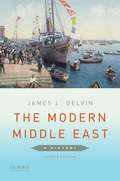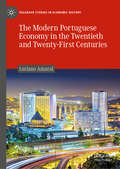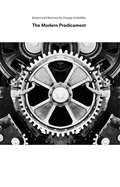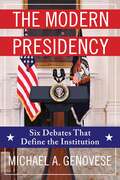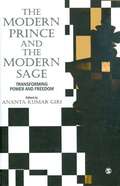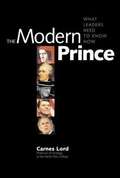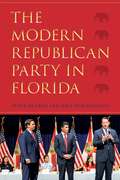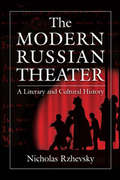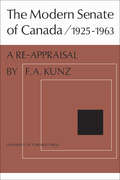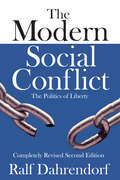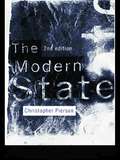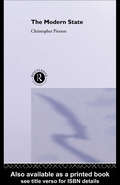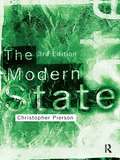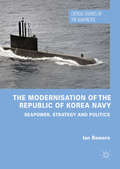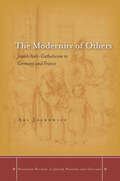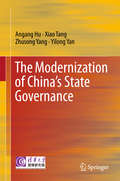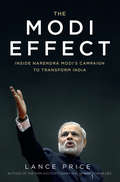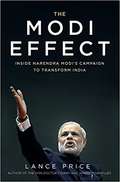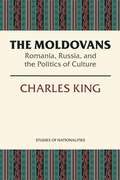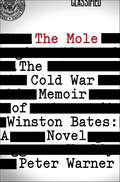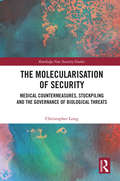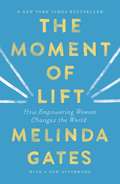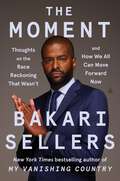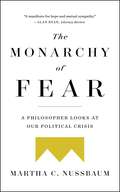- Table View
- List View
The Modern Middle East: A History, 4th Edition
by James L. GelvinExtensively revised and updated in the wake of the Arab uprisings, the changes that they fostered, and the fault lines that they exposed, the fourth edition of The Modern Middle East: A History explores how the forces associated with global modernity have shaped the social, economic, cultural, and political life in the region over the course of the past 500 years. Beginning with the first glimmerings of the current international state and economic systems in the sixteenth century, this book examines the impact of imperial and imperialist legacies, the great nineteenth-century transformation, cultural continuities and upheavals, international diplomacy, economic booms and busts, the emergence of authoritarian regimes and the varied forms of resistance to them and to imperialism in an area of vital concern to us all. The Modern Middle East: A History, Fourth Edition, is engagingly written--drawing from the author's own research and other studies--and enriched with maps and photographs, original documents, and an abundance of supplementary materials.
The Modern Portuguese Economy in the Twentieth and Twenty-First Centuries (Palgrave Studies in Economic History)
by Luciano AmaralThis book offers insights into the behaviour of the Portuguese economy in relation to economic growth from the twentieth century to the present. How did the 1891-92 crisis and World Wars impact Portugal economically? How did the Portuguese economy behave during the 'Golden Age' of economic growth in postwar Europe? What have the effects of the European Monetary Union been? Amaral examines long-running trends in the development of the modern Portuguese economy in order to help us understand various growth phases of the modern period. This title is important reading for economic historians and economists researching economic growth, crises, stablisation and monetary unions.
The Modern Predicament: Essays and Reviews
by George ScialabbaEssays and reviews concentrating on politics, economics, sociology and culture. With a forward by Barbara Ehrenreich. Most of the essays began as book reviews. As book reviews they were superior when published. As essays they are exceptional for their intelligence and clarity. George’s subjects are politics, religion and society. His subject is what people who are thinking ought to be paying attention to. The current cliché is that America has no public intellectuals. Every sentence George writes gives the lie to this bit of lazy journalese.
The Modern Presidency: Six Debates That Define the Institution
by Michael GenoveseThis book offers an accessible and compelling guide to the American presidency by exploring a series of key questions. How powerful is the American presidency, and to what extent is presidential power dependent on persuasion? Do the personal qualities of presidents drive events, or does the institution of the presidency shape their choices? Is the presidency a “unitary” office or a limited and circumscribed institution? Which is more important, character or competence? Is presidential success a matter of skill or opportunity? And will future presidencies turn away from checks and balances in favor of illiberal democracy?Michael A. Genovese, a leading scholar of the presidency, provides a clear overview of the core arguments and debates over the essential characteristics of this contradictory institution. Ideal for classroom use, this book provides insights into what the presidency was designed to be, what it has evolved into, how it has been reshaped to respond to new demands, and what its future might hold. Engaging and reader-friendly, The Modern Presidency gives students the tools to think critically about the nature of this complex office and how its powers can be wielded.
The Modern Prince and the Modern Sage: Transforming Power and Freedom
by Ananta Kumar GiriEver since the Renaissance in the thirteenth century, the ‘prince’ has been the dominant archetype of ‘being’ and ‘becoming’. Power and politics have provided the modern world with determinant frames of self-constitution and social emancipation, along with a singular definition of ‘freedom’. In this context, The Modern Prince and the Modern Sage: Transforming Power and Freedom is concerned with rethinking and transforming the concepts of ‘power’ and ‘freedom’ in discourse, society and history. This book draws from various sources—traditions of wisdom, creative experiments in socio-political theorizing and spiritual mobilizations—and brings together voices of struggle and movements for creative transformations from around the world. It addresses epochal issues of our times such as responsibility and shared sovereignties and appeals to a wide readership in humanities and social sciences and would be of interest to all seeking souls and movements. It will also be an invaluable reading resource for students and researchers of social and political theory, philosophy, sociology, anthropology, development studies, cultural studies and religious studies.
The Modern Prince: What Leaders Need to Know Now
by Carnes LordIn this penetrating work, an eminent political scientist offers a provocative treatise on the requirements of leadership in the modern world.
The Modern Republican Party in Florida
by Peter Dunbar Mike HaridopolosDespite Florida’s current reputation as a swing state, there was a time when its Republicans were the underdogs against a Democratic powerhouse. This book tells the story of how the Republican Party of Florida became the influential force it is today. Republicans briefly came to power in Florida after the Civil War but were called “carpetbaggers” and “scalawags” by residents who resented pro-Union leadership. They were so unpopular that they didn’t earn official party status in the state until 1928. Peter Dunbar and Mike Haridopolos show how, due largely to a population boom in the state and a schism in the Democratic Party, Republicans slowly started to see their ranks swell. This book chronicles the paths that led to a Republican majority in both the state Senate and House in the second half of the twentieth century and highlights successful campaigns of Florida Republicans for national positions. It explores the platforms and impact of Republican governors from Claude Kirk to Ron DeSantis. It also looks at how a robust two-party system opened up political opportunities for women and minorities and how Republicans affected pressing issues such as public education, environmental preservation, and criminal justice. As the Sunshine State enters its third decade under GOP control and partisan tensions continue to mount across the country, this book provides a timely history of the modern political era in Florida and a careful analysis of challenges the Republican Party faces in a state situated at the epicenter of the nation’s politics.
The Modern Russian Theater: A Literary and Cultural History
by Nicholas RzhevskyThis comprehensive and original survey of Russian theater in the twentieth century and into the twenty-first encompasses the major productions of directors such as Meyerhold, Stanislavsky, Tovostonogov, Dodin, and Liubimov that drew from Russian and world literature. It is based on a close analysis of adaptations of literary works by Pushkin, Dostoevsky, Gogol, Blok, Bulgakov, Sholokhov, Rasputin, Abramov, and many others."The Modern Russian Stage" is the result of more than two decades of research as well as the author's professional experience working with the Russian director Yuri Liubimov in Moscow and London. The book traces the transformation of literary works into the brilliant stagecraft that characterizes Russian theater. It uses the perspective of theater performances to engage all the important movements of modern Russian culture, including modernism, socialist realism, post-moderninsm, and the creative renaissance of the first decades since the Soviet regime's collapse.
The Modern Senate of Canada 1925-1963
by Frank KunzThe role of the senate has changed much in recent years and—judging by the amount of recent public discussion on its role—might change even more in the future. This new study, the theoretical framework and theoretical discussion of which lift it out of the merely descriptive, contains a great deal of well-marshalled new material, from manuscript and ephemeral sources as well as from the printed Senate Debates Journals, and Reports of Committees. Little is generally known about the Senate, and of what little, much is erroneous. Professor Kunz's mass of detail and factual data, along with his evaluation of second chambers and of the performance of the Canadian Senate in particular, will do much to remedy this situation.
The Modern Social Conflict: The Politics of Liberty
by Ralf DahrendorfRevolutions are melancholy moments in history—brief gasps of hope that emerges from misery and disillusionment. This is true for great revolutions, like 1789 in France or 1917 in Russia, but applies to lesser political upheavals as well. Conflict builds into a state of tense confrontation, like a powder keg. When a spark is thrown, an explosion takes place and the old edifice begins to crumble. People are caught up in an initial mood of elation, but it does not last. Normality catches up.Why do revolutions occur? In this completely revised edition of The Modern Social Conflict, Ralf Dahrendorf explores the basis and substance of social and class conflict. Ultimately, he finds that conflicts are about enhancing life chances; that is, they concern the options people have within a framework of social linkages, the ties that bind a society, which Dahrendorf calls ligatures. The book offers a concise and accessible account of conflict's contribution to democracies, and how democracies must change if they are to retain their political and social freedom. This new edition takes conflict theory past the fall of the Berlin Wall in 1989 and into the present day.Upon publication of the original 1988 edition, Stanley Hoffmann stated, "Ralf Dahrendorf is one of the most original and experienced social and political writers of our time. . . . [this book] is both a survey of social and political conflict in Western societies from the eighteenth century to the present and a tract for a new'radical liberalism.'" And Saul Friedlander wrote, "Ralf Dahrendorf has written a compelling book . . . the brilliant contribution of a convinced liberal to the study of conflict within contemporary democratic society."
The Modern State
by Christopher PiersonThe modern state is hugely important in our everyday lives. It takes nearly half our income in taxes. It registers our births, marriages and deaths. It educates our children and pays our pensions. It has a unique power to compel, in some cases exercising the ultimate sanction of preserving life or ordering death. Yet most of us would struggle to say exactly what the state is.The Modern State offers a clear, comprehensive and provoking introduction to one of the most important phenomena of contemporary life. Topics covered include:* the nation state and its historical context* state and economy* state and societies* state and citizens* international relations* the future of the state
The Modern State
by Christopher PiersonThe modern state is hugely important in our everyday lives. It takes nearly half our income in taxes. It registers our births, marriages and deaths. It educates our children and pays our pensions. It has a unique power to compel, in some cases exercising the ultimate sanction of preserving life or ordering death. Yet most of us would struggle to say exactly what the state is.The Modern State offers a clear, comprehensive and provoking introduction to one of the most important phenomena of contemporary life. Topics covered include:* the nation state and its historical context* state and economy* state and societies* state and citizens* international relations* the future of the state
The Modern State
by Christopher PiersonThe new edition of this well-established and highly regarded textbook continues to provide the clearest and most comprehensive introduction to the modern state. It examines the state from its historical origins at the birth of modernity to its current jeopardized position in the globalized politics of the 21st Century. The book has been entirely revised and updated throughout, including substantial new material on the financial crisis and the environment. Subjects covered include: • The evolution of the state system • Placing the state in modernity• States and societies • State and economy • States and citizens • States and the international order • States of the twenty-first century This book is essential reading for all those studying the state, international relations and comparative politics.
The Modernisation of the Republic of Korea Navy: Seapower, Strategy and Politics (Critical Studies of the Asia-Pacific)
by Ian BowersThis book sheds light on one of the most under-studied but powerful navies in the world. Using a multifaceted approach, it examines how the Republic of Korea Navy (ROKN) has sought to transform itself from a coastal naval force focused solely on deterring North Korea to a navy capable of operating in the blue waters of East Asia and beyond. The project argues that peninsular and regional security dynamics, technological developments, the US-South Korea alliance and internal politics combine to inform and shape ROKN modernisation.
The Modernity of Others: Jewish Anti-Catholicism in Germany and France
by Ari JoskowiczThe most prominent story of nineteenth-century German and French Jewry has focused on Jewish adoption of liberal middle-class values. "The Modernity of Others" points to an equally powerful but largely unexplored aspect of modern Jewish history: the extent to which German and French Jews sought to become modern by criticizing the anti-modern positions of the Catholic Church. Drawing attention to the pervasiveness of anti-Catholic anticlericalism among Jewish thinkers and activists from the late eighteenth to the early twentieth century, the book turns the master narrative of Western and Central European Jewish history on its head. From the moment in which Jews began to enter the fray of modern European politics, they found that Catholicism served as a convenient foil that helped them define what it meant to be a good citizen, to practice a respectable religion, and to have a healthy family life. Throughout the long nineteenth century, myriad Jewish intellectuals, politicians, and activists employed anti-Catholic tropes wherever questions of political and national belonging were at stake: in theoretical treatises, parliamentary speeches, newspaper debates, the founding moments of the Reform movement, and campaigns against antisemitism.
The Modernization of China’s State Governance
by Angang HuThis book elaborates on how China's previous leaders established, consolidated, developed and improved China's basic modern governance system. It also explores and discusses how to correctly, objectively and scientifically perceive, evaluate and promote the modernization of China's state governance and its capacity. Using detailed and accurate data and extensive background information, this book analyzes the changing history and future perspectives of the relationship between China's government and the market, state-owned economy and private economy. Covering an extensive timespan, this comprehensive book includes contributions from Chinese scholars specialized in contemporary China studies discussing the major breakthroughs and decision-making consultations in Chinese development strategies. It also offers insights into the research mechanism and development levels of Chinese think tanks based at research institutes. Last but not least, it sheds light on the democratic advances in the Chinese decision-making process.
The Modi Effect
by Lance PriceFrom the author of Where Power Lies and The Spin Doctor's Diary, comes a new book that tells the story of Narendra Modi's meteoric rise to power on the international stage, The Modi Effect: Inside Narendra Modi's Campaign to Transform India. With exclusive access to the architects of Modi's campaign, Prime Minister Modi and his current cabinet, Mr. Price has delivered an insider's account of this incredible political movement. In examining Modi's character and his position as leader of an increasingly powerful nation, Mr. Price explores the global impact of Modi's victory and its on-going transformation of international politics. On May 16, 2014, Narendra Modi was declared the winner of the largest democratic election ever conducted in human history. But how did this impoverished chai wallah, who sold tea on trains as a boy, rise to become Prime Minister of India?Political parties in the West pride themselves on the sophistication of their election strategies, but they all have a lot to learn from this election. Modi's campaign was a master class in modern electioneering. His team created an election machine that broke new ground in the use of social media, the Internet, mobile phones, and digital technologies. Modi took part in thousands of public events, but in such a vast country it was impossible to visit every town and village in person. How did he do it? Via "virtual Modi"-a life-sized 3D hologram-beamed to parts of the vast nation he could not reach in person. These pioneering techniques brought millions of young people-the holy grail of election strategists everywhere-to ballot boxes. Under Narendra Modi's leadership the Bharatiya Janata Party (BJP) won a crushing victory in the 2014 general election leaving the Congress Party of the Gandhi political dynasty in disarray. For the first time in the history of India, an opposition leader swept to power with an overall majority.Former BBC correspondent and political consultant Lance Price was granted exclusive access to Prime Minister Modi and his team of advisers to write this book. With complete freedom to tell the story as he found it, Price details Modi's rise to power, the extraordinary election victory, and its aftermath. The book examines Modi's rise, his unprecedented mass appeal despite the controversies surrounding him (including the West shunning him), and the pivotal role he will now play on the international stage.The Modi Effect exposes the changing landscape of electioneering in twenty-first century global politics through the story of Modi's campaign, when message management and technological wizardry combined to create a vote-winning colossus.
The Modi Effect: Inside Narendra Modi's campaign to transform India
by Lance PriceHow did a 'chai wallah' who sold tea on trains as a boy become Prime Minister of India? On May 16, 2014, Narendra Modi was declared the winner of the largest election ever conducted anywhere in the world, having fought a campaign unlike any before. Political parties in Britain, Australia and North America pride themselves on the sophistication of their election strategies, but Modi's campaign was a master-class in modern electioneering. His team created an election machine that broke new ground in the use of social media, the Internet, mobile phones and digital technologies. Modi took part in thousands of public events, but in such a vast country it was impossible to visit every town and village. The solution? A 'virtual Modi' - a life-size 3D hologram - beamed to parts he could not reach in person. These pioneering techniques brought millions of young people to the ballot box - the holy grail of election strategists everywhere - as Modi trounced the governing Congress Party led by the Gandhi dynasty. Former BBC correspondent and Downing Street communications expert Lance Price has been granted exclusive access to Prime Minister Narendra Modi and his team of advisers. With complete freedom to tell it as he finds it, he details Modi's rise to power, the extraordinary election victory and its aftermath. The Modi Effect: Inside Narendra Modi's campaign to transform India lifts the lid on a whole new box of tricks, where message-management and IT wizardry combined to create a vote-winning colossus of awesome potency.
The Modi Effect: Inside Narendra Modi's campaign to transform India
by Lance PriceHow did a 'chai wallah' who sold tea on trains as a boy become Prime Minister of India? On May 16, 2014, Narendra Modi was declared the winner of the largest election ever conducted anywhere in the world, having fought a campaign unlike any before. Political parties in Britain, Australia and North America pride themselves on the sophistication of their election strategies, but Modi's campaign was a master-class in modern electioneering. His team created an election machine that broke new ground in the use of social media, the Internet, mobile phones and digital technologies. Modi took part in thousands of public events, but in such a vast country it was impossible to visit every town and village. The solution? A 'virtual Modi' - a life-size 3D hologram - beamed to parts he could not reach in person. These pioneering techniques brought millions of young people to the ballot box - the holy grail of election strategists everywhere - as Modi trounced the governing Congress Party led by the Gandhi dynasty. Former BBC correspondent and Downing Street communications expert Lance Price has been granted exclusive access to Prime Minister Narendra Modi and his team of advisers. With complete freedom to tell it as he finds it, he details Modi's rise to power, the extraordinary election victory and its aftermath. The Modi Effect: Inside Narendra Modi's campaign to transform India lifts the lid on a whole new box of tricks, where message-management and IT wizardry combined to create a vote-winning colossus of awesome potency.
The Moldovans: Romania, Russia, and the Politics of Culture (Studies of Nationalities)
by Charles KingThe first English-language book to present a complete picture of this intriguing East European borderland, The Moldovans: Romania, Russia, and the Politics of Culture, illuminates the perennial problems of identity politics and cultural change that the country has endured.
The Mole: The Cold War Memoir of Winston Bates: A Novel
by Peter WarnerThe fictitious memoir of an unlikely foreign spy planted in Washington, D.C., in the years after World War IIRecruited by a foreign power in postwar Paris and sent to Washington, Winston Bates is without training or talent. He might be a walking definition of the anti-spy. Yet he makes his way onto the staff of the powerful Senator Richard Russell, head of the Armed Services Committee. From that perch, Bates has extensive and revealing contacts with the Dulles brothers, Richard Bissell, Richard Helms, Lyndon Johnson, Joe Alsop, Walter Lippman, Roy Cohn, and even Ollie North to name but a few of the historical players in the American experience Winston befriends—and haplessly betrays for a quarter century.A comedy of manners set within the circles of power and information, Peter Warner's The Mole is a witty social history of Washington in the latter half of the twentieth century that presents the question: How much damage can be done by the wrong person in the right place at the right time?Written as Winston's memoir, The Mole details the American Century from an angle definitely off center. From Suez, the U-2 Crash, the Bay of Pigs, Vietnam, and Watergate, the novel is richly and factually detailed, marvelously convincing, and offers the reader a slightly subversive character searching for identity and meaning (as well as his elusive handler) in a heady time during one of history's most defining eras.
The Molecularisation of Security: Medical Countermeasures, Stockpiling and the Governance of Biological Threats (Routledge New Security Studies)
by Christopher LongThis book investigates the way that the molecular sciences are shaping contemporary security practices in relation to the governance of biological threats. In response to biological threats, such as pandemics and bioterrorism, governments around the world have developed a range of new security technologies, called medical countermeasures, to protect their populations. This book argues that the molecular sciences’ influence has been so great that security practices have been molecularised. Focusing on the actions of international organisations and governments in the past two decades, this book identifies two contrasting conceptions of the nature or inherent workings of molecular life as driving this turn. On the one hand, political notions of insecurity have been shaped by the contingent or random nature of molecular life. On the other, the identification of molecular life’s constant biological dynamics supports and makes possible the development and stockpiling of effective medical countermeasures. This study is one of the few to take seriously the conceptual implications that the detailed empirical workings of biotechnology have on security practices today. This book will be of much interest to students of security studies, bio-politics, life sciences, global governance, and International Relations in general.
The Moment of Lift: How Empowering Women Changes the World
by Melinda French GatesNEW YORK TIMES BESTSELLER“In her book, Melinda tells the stories of the inspiring people she’s met through her work all over the world, digs into the data, and powerfully illustrates issues that need our attention—from child marriage to gender inequity in the workplace.” — President Barack Obama“The Moment of Lift is an urgent call to courage. It changed how I think about myself, my family, my work, and what’s possible in the world. Melinda weaves together vulnerable, brave storytelling and compelling data to make this one of those rare books that you carry in your heart and mind long after the last page.” — Brené Brown, Ph.D., author of the New York Times #1 bestseller Dare to Lead “Melinda Gates has spent many years working with women around the world. This book is an urgent manifesto for an equal society where women are valued and recognized in all spheres of life. Most of all, it is a call for unity, inclusion and connection. We need this message more than ever.” — Malala Yousafzai "Melinda Gates's book is a lesson in listening. A powerful, poignant, and ultimately humble call to arms." — Tara Westover, author of the New York Times #1 bestseller Educated A debut from Melinda French Gates, a timely and necessary call to action for women's empowerment. “How can we summon a moment of lift for human beings – and especially for women? Because when you lift up women, you lift up humanity.” For the last twenty years, Melinda Gates has been on a mission to find solutions for people with the most urgent needs, wherever they live. Throughout this journey, one thing has become increasingly clear to her: If you want to lift a society up, you need to stop keeping women down. In this moving and compelling book, Melinda shares lessons she’s learned from the inspiring people she’s met during her work and travels around the world. As she writes in the introduction, “That is why I had to write this book—to share the stories of people who have given focus and urgency to my life. I want all of us to see ways we can lift women up where we live.” Melinda’s unforgettable narrative is backed by startling data as she presents the issues that most need our attention—from child marriage to lack of access to contraceptives to gender inequity in the workplace. And, for the first time, she writes about her personal life and finding her voice. Throughout, she shows how there has never been more opportunity to change the world—and ourselves. Writing with emotion, candor, and grace, she introduces us to remarkable women and shows the power of connecting with one another. When we lift others up, they lift us up, too.
The Moment: Thoughts on the Race Reckoning That Wasn't and How We All Can Move Forward Now
by Bakari SellersThe New York Times bestselling author of My Vanishing Country examines the modern political landscape and policies that are impacting Black families and communities and offers solutions for a better tomorrow. In late May in 2020, while discussing the murder of George Floyd on CNN, Bakari Sellers spoke from the heart sharing devastating insight that touched millions around the world: “It’s just so much pain. You get so tired. We have black children. I have a 15-year-old daughter. I mean, what do I tell her? I’m raising a son. I have no idea what to tell him. It’s just—it’s hard being black in this country when your life is not valued and people are worried about the protesters and the looters. And it’s just people who are frustrated for far too long and not have their voices heard.”In this powerful and persuasive book, Sellers expands on the issues he addressed in his New York Times bestseller My Vanishing Country, examining national politics and policies that deeply impact not only Black people in his home state of South Carolina but the lives of millions of African Americans in communities across the nation. Four years later, Sellers has an answer to the question he raised on CNN, offering much-needed prescriptions to help all Black American lives.Sellers explores inequities in healthcare, education, early childhood education, and policing, drawing on interviews with numerous thought leaders such as pioneering voting rights and poverty activist the Rev. William Barber, and Ben Crump, the civil rights legend who successfully uses the law to achieve justice for people of color in racially charged cases. He also shares his thoughts on conservative media and the forces and dark money behind firebrands such as Tucker Carlson. This thoughtful and practical work is a timely meditation on the state of our world today and how we can all play a part in making it better for tomorrow.
The Monarchy of Fear: A Philosopher Looks at Our Political Crisis
by Martha C. NussbaumFrom one of the world&’s most celebrated moral philosophers comes a thorough examination of the current political crisis and recommendations for how to mend our divided country.For decades Martha C. Nussbaum has been an acclaimed scholar and humanist, earning dozens of honors for her books and essays. In The Monarchy of Fear she turns her attention to the current political crisis that has polarized American since the 2016 election. Although today&’s atmosphere is marked by partisanship, divisive rhetoric, and the inability of two halves of the country to communicate with one another, Nussbaum focuses on what so many pollsters and pundits have overlooked. She sees a simple truth at the heart of the problem: the political is always emotional. Globalization has produced feelings of powerlessness in millions of people in the West. That sense of powerlessness bubbles into resentment and blame. Blame of immigrants. Blame of Muslims. Blame of other races. Blame of cultural elites. While this politics of blame is exemplified by the election of Donald Trump and the vote for Brexit, Nussbaum argues it can be found on all sides of the political spectrum, left or right. Drawing on a mix of historical and contemporary examples, from classical Athens to the musical Hamilton, The Monarchy of Fear untangles this web of feelings and provides a roadmap of where to go next.
